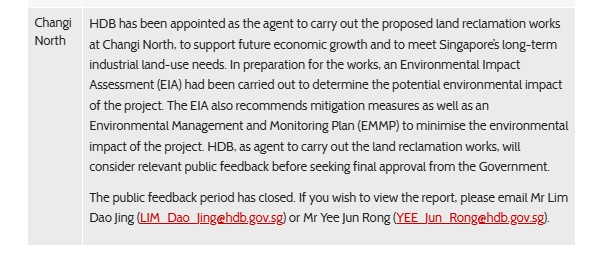Planned reclamation works to expand Changi Aviation Park will not affect access to popular intertidal areas off Changi Beach Park, the Housing & Development Board (HDB) and Urban Redevelopment Authority (URA) said in a joint statement issued on 28 July 2025.
The statement comes amid concerns from nature enthusiasts and conservationists that the project may limit access to one of Singapore’s last accessible intertidal shorelines, known for its rich marine biodiversity.
View this post on Instagram
Authorities defend confidentiality agreements for EIA access, citing security sensitivities
The authorities clarified that the environmental impact assessment (EIA) report for the project contains information deemed sensitive for security reasons.
As such, members of the public are required to sign confidentiality agreements before viewing the document.
HDB and URA stated that this approach strikes a balance between transparency and national security, allowing the public to access the report while safeguarding sensitive content.
According to the statement, “rather than not disclose them altogether, we would facilitate the viewing of the reports, both during and after the public disclosure period, but would require viewers to sign a non-disclosure agreement, which covers the specific sensitive information within the report.”
Petition calls for scaled-back plans
The assurance follows a petition launched by nature guide Neo Xiaoyun and environmental storyteller Julian Paul Lee.
The petition, created on 13 July 2025, urged the authorities to scale back reclamation plans to protect the intertidal ecosystem.
It also raised concerns that the use of non-disclosure agreements undermines meaningful public consultation.
As of 28 July 2025, more than 1,470 people have signed the petition.
Neo and Lee, both aged 29, highlighted that the intertidal areas near Changi Beach Park are among the last remaining public spaces where Singaporeans can experience marine biodiversity up close.
At low tides, the shoreline attracts visitors eager to spot anemones, octopi, hermit crabs, and even rare species like the tiger anemone, which was identified as a new species in 2023 after a decade of research and citizen science efforts.
HDB: Reclaimed area to “support economic growth and long-term industrial needs”
On 2 July 2025, The Straits Times reported that about 193ha of land off Changi will be reclaimed.
This is roughly twice the size of Gardens by the Bay.
At the time, HDB said the reclaimed area will be used “to support Singapore’s future economic growth and to meet long-term industrial land use needs”
However, the project has already been reduced by about one-fifth from its original plan to protect one of Singapore’s largest seagrass meadows.
HDB and URA confirmed that Carparks 6 and 7 at Changi Beach Park will not be affected by the works.
They added that stakeholders with conservation expertise, including nature groups, youth representatives, and academics, were consulted during the planning phase in collaboration with the National Parks Board (NParks).
Nature groups warn of ecosystem threats
Despite these assurances, some environmental researchers and advocates remain concerned.
Debby Ng, a doctoral candidate at the National University of Singapore’s Centre for Nature-based Climate Solutions, warned that sediment stirred up during reclamation could smother or bury nearby seagrass meadows.
Research Assistant Professor Stephen Chua of Nanyang Technological University’s Earth Observatory of Singapore added that increased water circulation during reclamation could introduce more sediment, harming intertidal and coastal organisms.
Chua noted that such impacts could extend beyond Changi to areas like the Southern Islands.
Public feedback period closed but access remains
The public feedback period for the proposed reclamation at Changi North has closed.
However, members of the public can still email HDB to request access to the EIA report.
HDB maintains that confidentiality agreements are necessary when reports contain details related to security.
Most other EIA reports are published online without such restrictions, the authorities said.

Source: HDB
Calls for clearer confidentiality rules
Legal experts have also weighed in on the use of non-disclosure agreements, according to the petition’s statement.
Kala Anandarajah, head of competition, antitrust, and trade practice at Rajah & Tann Singapore LLP, pointed out that confidentiality agreements may prevent researchers, journalists, and civil society groups from freely analysing or sharing information.
She added that the current approach risks creating a “chilling effect” that discourages civic participation.
Among 11 environmental assessments conducted in the first half of 2025, three required NDAs.
Advocates argue that clearer guidelines are needed to determine what information justifiably warrants confidentiality.
Intertidal zones hold educational value
Neo Xiaoyun welcomed the authorities’ engagement with the petition but said more could be done to make environmental consultations meaningful.
She suggested that future EIAs should actively involve nature guides who hold years of observational data about the area’s biodiversity.
Neo emphasised that intertidal zones like Changi Beach are vital for public education and citizen science.
She added that such spaces became especially important during the COVID-19 pandemic, offering Singaporeans an opportunity to reconnect with nature.
Protecting public classrooms of the sea
Neo and Lee argue that losing intertidal habitats to reclamation would mean losing what they described as “public classrooms” for future generations.
These areas support educational walks, citizen science projects, beach clean-ups, and recreation that cultivate empathy and stewardship for Singapore’s natural heritage.
Their petition urges HDB and other agencies to further scale back reclamation works and prioritise open access to non-sensitive information.
They stress that protecting these fragile ecosystems aligns with national efforts to nurture environmental awareness and responsibility.
Future reclamation plans
The Changi North project is part of broader plans to create more land at Singapore’s eastern end.
This includes a larger 900ha reclamation project off Changi Bay.
The authorities have reiterated that they will consider public feedback before seeking final approval for the works.
Environmental advocates say they hope the concerns raised over Changi North will guide how future projects balance development with conservation.
The post Changi reclamation plan sparks biodiversity concerns; authorities defend confidentiality over EIA access appeared first on The Online Citizen.


